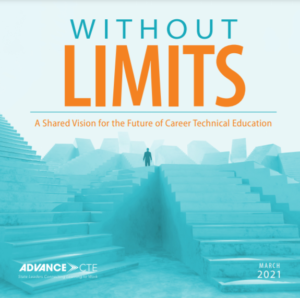 This month, Advance CTE celebrates the 3 year anniversary of the release of Without Limits: A Shared Vision for the Future of Career Technical Education (CTE Without Limits), supported by over 40 national organizations. As part of the celebration, Advance CTE is highlighting the initiatives, outcomes and lessons learned of current and former states who have participated in technical assistance opportunities to conduct the challenging but necessary work to fully realize the vision in their state.
This month, Advance CTE celebrates the 3 year anniversary of the release of Without Limits: A Shared Vision for the Future of Career Technical Education (CTE Without Limits), supported by over 40 national organizations. As part of the celebration, Advance CTE is highlighting the initiatives, outcomes and lessons learned of current and former states who have participated in technical assistance opportunities to conduct the challenging but necessary work to fully realize the vision in their state.
Senior Director of Policy Nithya Govindasamy interviewed Colorado State CTE Director Sarah Heath to revisit the impact of technical assistance on realizing a more cohesive, flexible, and responsive career preparation ecosystem.
How has the CTE Without Limits influenced the mindset and priorities for CTE in your state?
CTE Without Limits has influenced the mindset and priorities in Colorado in terms of alignment. Our team has examined our goals and determined how we can better serve learners and how we can get learners ready for things that are connected geographically.
CTE Without Limits has also been central to goals and actions that can be taken to infuse the principles in the Perkins State Plan and strategic plan to ultimately support local leaders and educators. In Colorado, we are trying to connect the principles in the vision and the foundational commitments when evaluating our current goals and the gaps in our goals. We have used it to “check ourselves” and integrated it to support our stakeholder outreach and continue to use it as a bar and checkpoint.
What do you consider your state’s most impactful work in progress as a result of the CTE Without Limits vision?
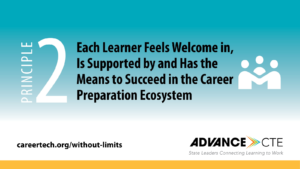 For Colorado, the most impactful work has occurred in our equity-centered work, specifically empowering locals through the Comprehensive Local Needs Assessment (CLNA) and tying it to CTE Without Limits through the Opportunity Gap Analysis (OGA). In particular, we’ve focused on sub-populations indicators and “checking ourselves” to ensure we were not being too generic in measuring success. Principle 2: Each learner feels welcome in, is supported by, and has the means to succeed in the career preparation ecosystem, pushed us to identify tangible tools to help locals; it also pushed our state team to view data differently and get comfortable with data. Tools like the heat map ease people into the work without the “equity stigma”.
For Colorado, the most impactful work has occurred in our equity-centered work, specifically empowering locals through the Comprehensive Local Needs Assessment (CLNA) and tying it to CTE Without Limits through the Opportunity Gap Analysis (OGA). In particular, we’ve focused on sub-populations indicators and “checking ourselves” to ensure we were not being too generic in measuring success. Principle 2: Each learner feels welcome in, is supported by, and has the means to succeed in the career preparation ecosystem, pushed us to identify tangible tools to help locals; it also pushed our state team to view data differently and get comfortable with data. Tools like the heat map ease people into the work without the “equity stigma”.
We are also using tools to analyze local performance and to inform local decision making. For example the OGA data was linked to school performance frameworks and school finance to show the intersections. We are training principals and need to train middle-management leaders in our schools to help them to make data-driven decisions to help all learners be successful.
In Colorado, working directly with locals to be more impactful has been a priority. We held a session about this work at CACTA (Colorado Association for Career and Technical Administrators, the Admin Division of ACTE in Colorado), where the designated CTE Directors attend for each district and they are empowered to engage the principals. Rural school districts are supported by Boards of Cooperative Educational Services or BOCES (typically fiscal agents for Perkins) and each have a Superintendent Council, so our team has taken the opportunity to use their meeting structure and support to offer more CTE services.
Additionally, Colorado has taken a “near-peer approach” and is leveraging the relationships with the BOCES and helping the state team connect with local leaders who are not always the designated CTE Director. The Colorado CTE Team is also reflecting on their experiences to ensure the best presenter or connector is available to support these cohorts. For example, the state Program Director for Agriculture, Natural Resources and Energy was a principal in a rural school district prior to being on the Colorado CTE Team so it makes perfect sense to connect her to projects where we are expanding the knowledge of our local principals in how to connect CTE data to their school performance data and goal setting.
Colorado participated in the inaugural cohort to provide vision-related technical assistance to states. What is one part of that work (highlighted here) that you have been able to build upon over the past year, and how?
Of the work highlighted in last year’s blog, we focused on Goal 3: “Building Local Leader Data Literacy: Leverage Advance CTE’s Opportunity Gap Analysis (OGA) process to increase data literacy of local CTE administrators and educators and in doing so improve data-focused storytelling of learners’ outcome and identification of program participation and success gaps.” In order to increase the data literacy of locals and teachers, we are offering professional development with a panel of local CTE directors. We are using the CLNA and OGA for action planning, and conducted needs assessment in-person during a statewide CTE roadshow.
In terms of what is next for us, we are intentionally incorporating learner voice into our work. We are focused on “how are we empowering local leaders and their data literacy” and helping them with storytelling. For example, our CTE concentrator graduation rate is 98% while our overall Colorado high school graduation rate is 83%. Elevating these data points and integrating into our storytelling on the local level will assist in destigmatizing CTE. CTE is being seen all over Colorado as a new strategic move in high school education. We are seeing Designed Career and Technical high schools being built in school districts who market their four-year college going culture. We are seeing most districts “up” their CTE programs and want to better serve learners across the board by offering multiple off ramps from industry credentials, Apprenticeship, and college credit.
We’ve been able to engage with families by going to the PTA conference and enhancing their data literacy. We are working with the entire ecosystem to empower local leaders, administrators, principals, parents/guardians, family members and learners and “empower” local communities by equipping them with better information to make more informed decisions. We are also helping connect education to the overall ecosystem through regional level conversations about industry needs and alignment.
What resources or support has been most helpful in moving this work and mindset forward?
For the Colorado team, the technical assistance and the actual resources, such as the Pushing the Limits Roadmap, has been the most helpful. We have used this resource to develop goals, to conduct an assessment of our current system, and develop an action plan. The tools were helpful in identifying the areas that need to be improved and we were able to use the tool to help locals assess their own system.
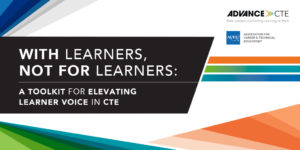 Another helpful resource was the With Learners, Not for Learners: A Toolkit for Elevating Learner Voice in CTE. We walked through the toolkit and tackled issues such as not “tokenizing” learners by just having them on advisory committees.
Another helpful resource was the With Learners, Not for Learners: A Toolkit for Elevating Learner Voice in CTE. We walked through the toolkit and tackled issues such as not “tokenizing” learners by just having them on advisory committees.
Having the tools, resources and support was definitely helpful when determining how to use the various pieces to help locals.
What principles and areas of work connected to the vision are you planning to focus on this year?
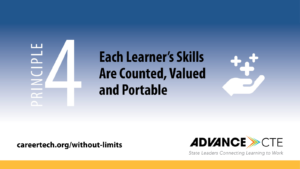 Colorado is currently focused on Principle 4: Each learner’s skills are counted, valued, and portable. We are centering this mindset in our work by leaning into Credit for Prior Learning (CPL), portable credit and policy change and matrix, faculty qualifications, and counting all learning that happens. In 2020, Colorado passed HB 20-1002, which enables students and adults to earn postsecondary credit for prior work experience, including work-based learning. A landscape report on CPL was released in 2021 that guides our work:
Colorado is currently focused on Principle 4: Each learner’s skills are counted, valued, and portable. We are centering this mindset in our work by leaning into Credit for Prior Learning (CPL), portable credit and policy change and matrix, faculty qualifications, and counting all learning that happens. In 2020, Colorado passed HB 20-1002, which enables students and adults to earn postsecondary credit for prior work experience, including work-based learning. A landscape report on CPL was released in 2021 that guides our work:
Through our team that supports concurrent enrollment as well as our work on the Colorado “Student Bill of Rights”, we are working to ensure learners are receiving the correct credit for earned Industry Recognized Credentials when they matriculate to an institution of higher education as well as their CTE high school experiences, even if it does not include concurrent enrollment, and assisting learners with understanding how to link these experiences to their college credits through articulation.
Colorado’s Governor has set a Skills-Based hiring expectation and as a team, we are using this expectation to help our employers who serve on our CTE advisory committees better understand how to post jobs to ensure they are attracting talent based on their skills.
Additional Resources
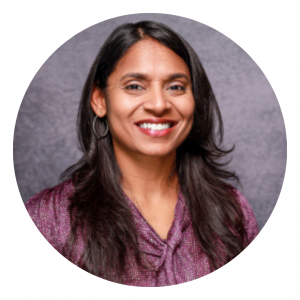 To learn about how to begin implementing CTE Without Limits in your state or community, read Colorado, Nebraska, and South Carolina’s origin and impact journeys so far.. Resources to learn about and implement the vision can be found on our CTE Without Limits webpage.
To learn about how to begin implementing CTE Without Limits in your state or community, read Colorado, Nebraska, and South Carolina’s origin and impact journeys so far.. Resources to learn about and implement the vision can be found on our CTE Without Limits webpage.


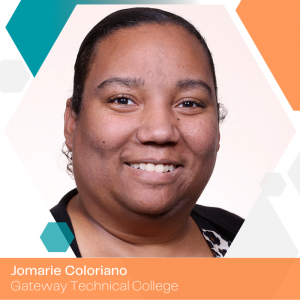 Tell me more about your journey to the Fellowship.
Tell me more about your journey to the Fellowship.